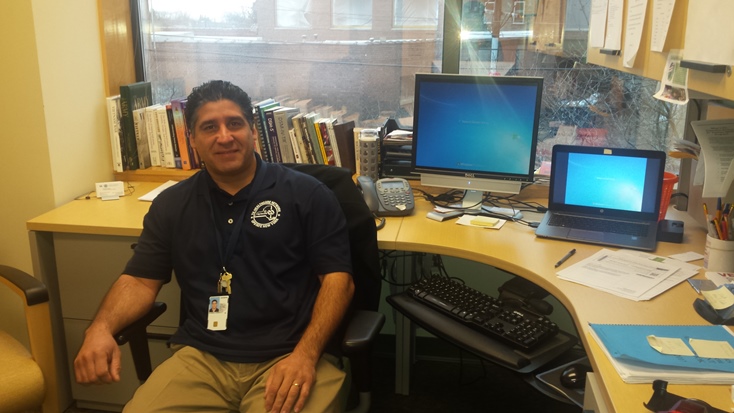On a cold night in late January, volunteers gathered at the Syracuse Rescue Mission in upstate New York. Among them was Roberto Alvarez, a VA employee and four years of service with the U.S. Army as an 11-Bravo infantryman– and despite the chill in the air, he was excited.
“I look forward to this night every year,” said Alvarez. “It is a challenge but I know that by being here, I’m making a difference in someone’s life.”
The challenge Alvarez was referring to was participating in the Point-in-Time (PIT) Count, an annual effort led by the U.S. Department of Housing and Urban Development (HUD) to estimate the number of Americans, including Veterans, without safe, stable housing. The PIT Count provides a national snapshot of homelessness and is one of the tools used to assess progress toward the goal of ending Veteran homelessness. In order to most accurately estimate the number of homeless Veterans, counts are conducted by volunteers in communities across the country on a single night in January.
Alvarez and other VA employees volunteered for the local 2017 PIT Count in Onondaga County as part of the Syracuse VA Medical Center’s Health Care for Homeless Veterans (HCHV) program outreach efforts. HCHV aims to reduce homelessness among Veterans by reaching out to those who are the most vulnerable and engaging them in supportive and rehabilitative services. By serving as an entry point, the program can then connect eligible Veterans to other VA and community resources and help them get back on their feet.
As a Veteran who previously experienced homelessness, Alvarez can relate to the difficulty some Veterans face after leaving the military: “I understand that transitioning to civilian life can be a challenge. Many homeless Veterans are isolated and vulnerable.”
He started his nine-year career at VA as a case manager for HUD-VASH, a collaborative housing program for Veterans exiting homelessness, and is now a community employment coordinator (CEC) at the Syracuse VAMC. As one of more than 150 CECs across the country, Alvarez and his team partner with local organizations and employers to host job fairs, resume writing workshops, mock interview sessions, and dress for success trainings that help Veterans exiting homelessness find, obtain and maintain employment. Over the last three years, he has created partnerships with organizations such as New Horizons and New Zealand Center to provide free computer and financial training, and the Small Business Administration to help Veterans who want to start or expand their own small business.
In addition to his “day job,” though, Alvarez also volunteers to represent VA at community engagements and is a coordinator for the annual VA2K Walk & Roll, an event that allows participants to support homeless Veterans through voluntary donations that go to support the VA homeless program. And, of course, he volunteers one night every January to participate in the PIT Count.
Like many VA employees, Alvarez approaches his work as much more than a job – it is a calling.
Shortly after 8 p.m., the Onondaga County volunteers were ready to hit the streets. For the next four and a half hours, Alvarez and his team scoured the areas surrounding local hospitals, 24-hour corner stores, schools, bridges and alleys looking for unsheltered people.
“Through my career and volunteer work with VA, I hope to be a bridge for Veterans by connecting them with the VA resources, community support and employment opportunities to help them succeed after their military service,” said Alvarez. “Helping those that have served our country is an honor. Everyone can make a difference for a Veteran that is homeless or at risk of being homeless. Just ask your local homeless program how you can help.”
If you know a Veteran who is homeless or at imminent risk of becoming homeless, refer him or her to the nearest VA Medical Center, where Homeless Coordinators are ready to help. Most VA Medical Centers are also staffed with Community Employment Coordinators, who can assist Veterans exiting homelessness with identifying potential job opportunities. Veterans and their families can also call 1-877-4AID-VET to get connected to VA services.

Topics in this story
More Stories
Summer Sports Clinic is a rehabilitative and educational sporting event for eligible Veterans with a range of disabilities.
Report examines the input of over 7,000 women Veterans: They are happier with VA health care than ever before.
Veterans and caregivers, you can help shape the future eligibility requirements for the VA Caregiver Support program.







Oh and trust me I lived everything with Jason, the nightmares and now I’m experiencing my own so don’t EVER tell a Vet’s wife we don’t experience HELL
Yeah but when a Veteran who needed help and the VA BLOCKED us at every single turn commits Suicide were left to FIGHT for death benefits that won’t cover SHIT. Take away my Caregivers pay take away my husbands benefits and SSDI and whats left HOMELESS that’s where I’m heading!!! Thank you for caring about US spouses. Jason didn’t even have a Primary Care Doctor for OVER a year and what Choice won’t grant us an outside doctor…your so damn kind. https://signalscv.com/2017/03/24/va-cuts-benefits-castaic-vets-widow/
But nothing for the spouse if the vet plans on leaving her
You are entitled to certain benefits depending on how long you were married to the vet. While being the spouse of a vet doesn’t entitle you to the same services, you also did not experience the same things on the same level as a vet. If your spouse deployed, you dealt with other issues, and you can get support for that. You just have to put in the effort.